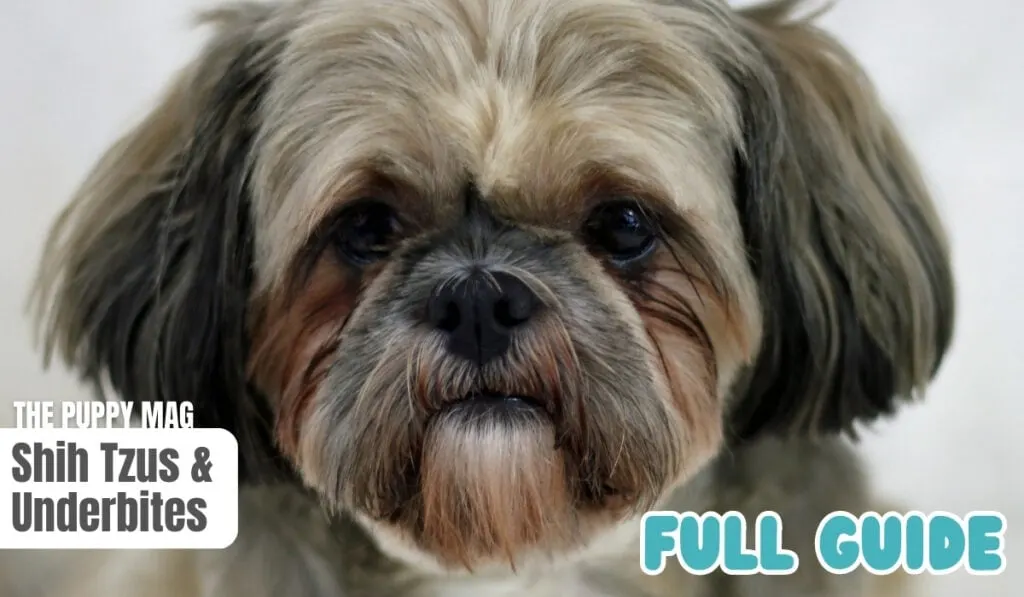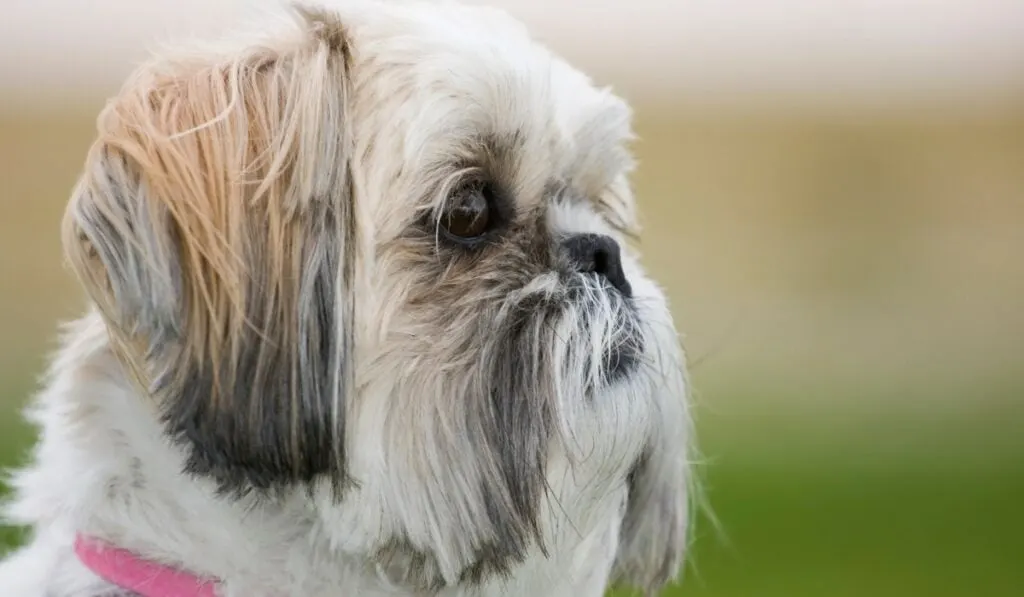Do you own a Shih Tzu with an underbite? If you do you likely have a lot of questions, you’re in the right place.
In this article, I’ll share everything you need to know about Shih Tzus with underbites, including what an underbite is, why they occur, potential health problems, and how to care for a Shih Tzu with an underbite.
In this article:
➡️ What is an underbite
➡️ Are underbites normal in Shih Tzus
➡️ What causes underbites in Shih Tzus
➡️ Health problems associated with underbites
➡️ Caring for a Shih Tzu with an underbite
➡️ When to seek help from a vet
➡️ FAQs: Shih Tzus with underbites

What is an Underbite?
An underbite, also known as mandibular prognathism or reverse scissor bite, is a dental condition where the lower jaw extends beyond the upper jaw, causing the lower teeth to sit in front of the upper teeth.
Underbites are common in Shih Tzus and other flat-faced breeds, like Bulldogs and Pugs.
In Shih Tzus, underbites are usually a genetic trait passed down through generations.
The breed’s unique head shape and facial features make them more prone to this dental quirk.
Related: 13 Breeds With Underbites! Full List
Are Underbites Normal in Shih Tzus?
While underbites are not the norm for all dogs, they are quite common in Shih Tzus.
In fact, an underbite is considered part of the AKC breed standard for Shih Tzus, meaning that it’s a characteristic that breeders and dog show judges look for in the breed.
However, just because it’s common doesn’t mean that every Shih Tzu will have an underbite, and there’s no need to worry if your pup doesn’t have one.
What Causes Underbites in Shih Tzus?
There are a handful of reasons that may cause an underbite in Shih Tzus:
- Genetics: The primary cause of underbites in Shih Tzus is genetics. The breed has a genetic predisposition to develop underbites due to their unique head shape and facial features. Inheritance of underbite traits from parent dogs can result in Shih Tzu puppies being born with underbites.
- Breed Standard: Underbites are considered part of the breed standard for Shih Tzus, meaning that breeders and dog show judges may actively select for this trait when breeding and judging dogs. This preference for underbites in the breed has contributed to the prevalence of the trait among Shih Tzus.
- Selective Breeding: Shih Tzus have been selectively bred over generations to exhibit certain physical characteristics, including their flat faces and short muzzles. These facial features can contribute to the development of an underbite in the breed.
- Growth and Development: Sometimes, uneven growth or development of a Shih Tzu’s jaws can result in an underbite. In some cases, the underbite may correct itself as the dog grows, but in others, the misalignment may persist throughout the dog’s life.
While breeding and growth and development can have an effect, it’s mostly down to genetics.
Health Problems Associated with Underbites
Underbites can lead to some health issues in Shih Tzus, though not all dogs with underbites will experience problems. Some potential health concerns include:
- Tooth misalignment: When the teeth don’t line up properly, they can wear unevenly or cause discomfort when the dog eats or chews.
- Gum injuries and infections: The misaligned teeth may rub against the dog’s gums, causing irritation or injury. This can lead to infections or periodontal disease.
- Difficulty eating: Some dogs with severe underbites may have difficulty picking up food or chewing it properly, which can affect their ability to eat and maintain a healthy weight.
- Breathing problems: In some cases, a severe underbite can contribute to brachycephalic obstructive airway syndrome (BOAS), which is a common issue in flat-faced breeds. This can cause difficulties with breathing, snoring, or sleep apnea.
It’s important to note that not all Shih Tzus with underbites will experience these health problems.
In many cases, the underbite is simply a cosmetic issue that doesn’t cause the dog any discomfort or affect their quality of life.

Caring for a Shih Tzu with an Underbite
If your Shih Tzu has an underbite, there are several things you can do to ensure they stay healthy and happy. Here are some tips on caring for a Shih Tzu with an underbite:
Regular Dental Checkups
Schedule regular dental checkups with your veterinarian to monitor your Shih Tzu’s oral health. Your vet can spot any issues early and recommend treatment if necessary. The American Veterinary Dental College recommends annual dental exams for all dogs, but you might want to schedule them more frequently for your Shih Tzu if they have an underbite.
Proper Dental Hygiene
Good dental hygiene is essential for all dogs, but it’s especially important for Shih Tzus with underbites. Here are some steps to maintain your dog’s dental health:
- Brush their teeth: Use a dog-specific toothpaste and a soft-bristled toothbrush to gently brush your Shih Tzu’s teeth at least two or three times a week. This will help remove plaque and prevent tartar buildup.
- Dental chews and toys: Provide your dog with dental chews and toys designed to help clean their teeth and promote gum health. These can be a fun way for your dog to maintain their oral hygiene while also enjoying a treat.
- Consider a dental diet: Some dog foods are formulated to help improve dental health by reducing plaque and tartar buildup. Consult with your veterinarian to see if a dental diet might be beneficial for your Shih Tzu.
Monitor for Changes
Keep an eye on your Shih Tzu’s underbite and watch for any changes in their eating habits, comfort level, or appearance.
If you notice any changes or if your dog seems to be experiencing pain, schedule an appointment with your veterinarian to discuss potential treatment options.
When to Seek Treatment
In some cases, a Shih Tzu’s underbite may require treatment to address health problems or improve their quality of life. Here are some signs that it’s time to consult your veterinarian about your dog’s underbite:
- Difficulty eating or drinking
- Weight loss or trouble maintaining a healthy weight
- Pawing at the mouth or face
- Excessive drooling
- Bad breath or visible signs of infection
- Reluctance to chew on toys or treats
Your veterinarian may recommend treatments such as orthodontic procedures or surgery to correct the underbite and improve your dog’s comfort and overall health.
In some cases, though, a conservative approach of monitoring and maintaining dental hygiene may be sufficient to manage the underbite without the need for more invasive treatments.
FAQ: Shih Tzus with Underbites
Here are some quick answers to frequently asked questions about Shih Tzus with underbites that weren’t covered in the main article.
Q: Can a Shih Tzu with an underbite still participate in dog shows?
A: Yes, a Shih Tzu with an underbite can still participate in dog shows. In fact, an underbite is considered part of the breed standard for Shih Tzus, so it’s a characteristic that breeders and dog show judges look for in the breed.
Q: Can an underbite correct itself as the dog grows?
A: In some cases, an underbite may correct itself as a Shih Tzu grows and their jaw develops. However, this is not guaranteed, and many dogs will continue to have an underbite throughout their lives. It’s essential to monitor your dog’s underbite and consult with your veterinarian if you have any concerns.
Q: Are there any specific feeding bowls or techniques that can help Shih Tzus with underbites eat more easily?
A: Elevated bowls can sometimes make it easier for a Shih Tzu with an underbite to eat and drink. You can also try spreading wet food on a flat plate or using a slow feeder bowl to encourage your dog to eat more slowly and chew their food thoroughly. Each dog’s needs will be different, so experiment with different feeding methods and tools to find what works best for your Shih Tzu.
Q: Can a Shih Tzu puppy’s underbite be detected early?
A: Yes, an underbite can often be detected in a Shih Tzu puppy as early as 8 to 12 weeks of age. However, the severity of the underbite may not be apparent until the dog’s adult teeth have fully developed, typically around 6 to 8 months of age. If you suspect your puppy may have an underbite, consult with your veterinarian for a thorough examination.
Q: Are there any ways to prevent an underbite in a Shih Tzu?
A: Since underbites in Shih Tzus are largely a genetic trait, there isn’t a foolproof way to prevent them. However, responsible breeding practices that prioritize the health and conformation of the parent dogs can help reduce the likelihood of underbites in their offspring. If you’re considering getting a Shih Tzu, research breeders carefully and choose one who is dedicated to breeding healthy, well-conformed dogs.
The Bottom Line: Shih Tzus and Underbites
While underbites are common in Shih Tzus, they don’t always cause problems.
Many dogs with underbites live healthy, happy lives without any significant health issues. As an owner, your responsibility is to monitor your Shih Tzu’s oral health and ensure they receive proper dental care.
By staying vigilant and working with your veterinarian, you can help your Shih Tzu with an underbite thrive and enjoy a comfortable life.
For more information on Shih Tzus and their dental health, check out these resources:
- VCA Animal Hospitals: Brachycephalic Airway Syndrome in Dogs
- Pet Health Network: Dental Health for Pets
- Whole Dog Journal: Dental Care for Dogs
